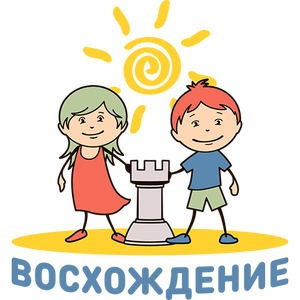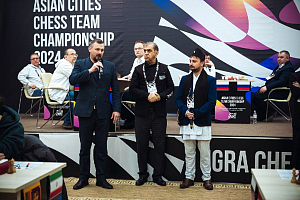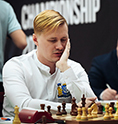10 August 2015
The smoke of victory
Part two of IM Alexander Zakharov's reminiscences about the last nationwide White Rook tournament held in the Soviet Union.
Alexander Petrovich developed almost a conveyor system for training his school's leading students: everything worked as smoothly as a clock. The Etud school gained momentum day by day and firmly established itself among the most prestigious chess schools of Moscow. The competition was extremely fierce within each of Etud's age groups: for example, I started playing on the 8th board in the 4th team. Among children above 14, one could single out the brothers Kiskin, Kraitsberg, the elder Betin, Apollonov, Yakovlev, the sisters Zhuchkov, Gerasimova, Vinogradov, Pavlenko, Komanov, Dvalishvili, Bogaudinov, Morev, Matveyev, Blinkov, and many others – a plethora of strong, talented, and interesting players. Several years later, for instance, after Mikhail Kraitsberg had moved to Israel, Garry Kasparov, the great world champion in his prime, held a simultaneous exhibition there in the mid-90s. The only one who defeated Kasparov was Kraitsberg. To recap, Kasparov outmatched his opponents by so wide a margin at that time that he beat countries' entire national teams in simuls. To sum up, Mikhail was a challenging player and he had finished a very serious chess school.
From this starting point, Alexander Petrovich sought to bring all the best young chess talents together within a single school, 962, in order to win the White Rook tournament. To achieve that, he required outstanding leadership skills, and the main obstacle was the reluctance of the young players and their parents to change the school, as schools in the Soviet Union were usually situated very close to children's homes – right in the nearest yard.

Bringing everyone together at school 962!
Alexander Petrovich's first and most important goal was to transfer Evgeniy Najer and Sergei Bogatirevich from school 606 to school 962, which was 25 minutes away from their homes if one walked quickly. Achieving this goal actually settled the issue with the first and third boards of the future team. It took Alexander Petrovich ages to persuade Najer's mother to move him to another school, as she made very logical objections against the transfer. Why go to a remote school when there's a school right in the yard? After lengthy coaxing and numerous attempts to take this stronghold, Alexander Petrovich found an irrefutable argument: "Why, Maria Zinovyevna, I've seen that school (No. 606). How can you stay there, there are no one but Mao Zedong's Reg Guards there!" That phrase was so typical of the Etud chess school's founder, and by the Red Guards he certainly didn't mean the brave Chinese revolutionaries. Maria Zinovyeva and her friend, Sergei Bogatirev's mother gradually capitulated. Then they were prepared to visit school 962 and talk to its director, Larisa Alexandrovna. The two powerful ships, the chess school director and the general school principal, traveled along the same course.

Larisa Alexandrovna Polyakova, School Principal
The decisive meeting took place in Larisa Alexandrovna's office, where we were often saved from the deputy principal's punishment and where our pranks, truancy and various other violations of school discipline were pardoned. In the presence of the two mothers, Alexander Petrovich drew glorious pictures of the future chess triumphs with his usual enthusiasm. After listening quietly to his emotional speech, Larisa Alexandrovna responded in a manner appropriate to a school principal: "Alexander Petrovich, you promise that the school will get some places and prizes, but I don't believe it for a second! But, of course, I will take your children." In fact, there was a shortage of intelligent and well-behaved children in the senior grades of the young school 962, and an urgent need to dilute the dubious contingent of near-bandits with smart children from elsewhere, while waiting for younger ones to grow up. Each of the new students lived up to these expectations, and Evgeniy and Sergei became part of the school 962 team.

Rightmost in the lower row – Sergei Bogatirevich, second on the left in the third row – Evgeniy Najer
Alexander Petrovich dealt with the matter of a strong girl player relatively easily. Chess school Etud initially counted on Alla Pilipyuk, whom we considered to be the Russian Polgar for her attitude to the game and her chess strength: Alla often defeated strong boys of her age. But her dad's temper was incompatible with Alexander Petrovich's training methods, and so they parted rather quickly. At about the same time the beautiful Olga Lysova turned up at Etud. Although she was only nine years old (born in 1980), she was among the best female chess players in Moscow. Together with her beauty came the full support package: dad, granddad (both strong chess players of a candidate master level) and grandma, who went to all the final national competitions with us later. At the initial stage, Alexander Petrovich found it rather difficult to communicate with such an extensive support group. But Olga was a really strong and talented chess player (among us, she was probably the first to become a star of a national level), and the aspiration to win was a powerful driver and, at the end of the day, a balancing political factor. Furthermore, her parents agreed to move Olga to school 962, and later she went to that school gladly.
So the first three "male" boards and the "female" one were manned up reliably, and the only unsettled issue was the fourth board. Alexander Petrovich set his eyes on the strong first-category players Yuri Prokopchuk, Dmitry Laptev and Sergei Skazobtsev, along with Mikhail Bernadiner and Sasha Zakharov mentioned earlier. The boys were of the same age (born in 1976) and got along like a house on fire. They diligently went to Etud classes together and participated in the same tournaments. Any White Rook team would clearly envy such a reserve. There were five worthy candidates – and just one place in the team. Whom to choose, how to resolve this issue? Once again, Alexander Petrovich acted like a real CEO, addressing the problem by approaching the target consistently.
The first step was to transfer Yuri, Dmitry and Sergei to school 962, which expanded his choices considerably and further increased the already cutthroat competition. The boys accepted it as an upfront bonus and continued to practice chess and participate in the chess school's scheduled tournaments. Alexander Petrovich was well aware that the current 962 team would win the Moscow White Rook even if he made a mistake choosing the fourth board player. But he needed to understand how strong was Mikhail Bernadiner, who did chess at the Petrosian school and not his, and how quickly the young Sasha Zakharov was progressing. Which is why we took turns with Mikhail, but the older boy, both in age and rank, was the official main team player, of course.

The "golden team" during studies
The Moscow White Rook went predictably and finished with a confident victory of school 962 – and that with Alexander Petrovich barely involved in the process. It was Yurik who accompanied us at the matches, and his task was to maintain discipline. Yurik made an important contribution to our victory on the very first day. Before the playing day consisting of two games started, the entire team gathered near school 962 with plenty of time to spare for the trip and, led by Yurik, moved towards the Olimpilysky sports complex. The rule was a very good one: we had a good time on our way, shared jokes, sang songs, had fun, and of course fused together. Sergei Bogatirevich risked breaking this tradition, which Yurik had established in the previous year, by saying that it was more convenient for him to go to the venue directly from home and that he saw no point in mass-scale marches. Yurik said nothing: he was probably waiting for his pedagogical moment of glory.
Sergei's real problems started with his not knowing where exactly the chess club was located in the Olimpiysky sports complex. He had to go to the left from the central entrance, and the distance was considerable – nearly half of the complex's circumference. Sergei followed the just-in-time principle when going to tournaments, and since he turned right he was doomed to be 15 minutes late, regardless of how quickly he walked. Mobile phones and web applications were not available at that time.
We came to the first round in an excellent mood 20 minutes before the start, took our seats and began waiting for Sergei. The less time remained, the gloomier Yurik became: he wasn't really aware of the strength of our team, which was able to whitewash its first-round opponents in half an hour. Ten minutes later Ilya, the team captain, approached Yurik and explained what options we had according to the existing rules. Four of the five participants could start playing, but then we would get a zero on Sergei's board immediately. Or else we could wait, i. e. refrain from starting a game on any of the boards before Sergei arrived. Of course, we were ready to wait for about 20 minutes: such a handicap wasn't too great for the one-hour time control. Yurik, wary that someone would lose patience and make a move, ordered: "Stand up, have a walk!" The artificially created tension mounted.
Sergei came running like mad, totally out of breath, in about 15 minutes. Yurik met his with a stern question: "Bogatirevich?!", to which Sergei countered, "I suppose!" Realizing the gravity of the situation, we started taking our places at the boards fussily, following Yurik's command "Sit!" Sergei was the first to get seated at his third board, and Yurik understood that there was no time for distractions and the disciplinary lesson could wait. The match ended fairly quickly with the score 5-0, like the following match of the same playing day. Yurik shined with joy like a well-polished teapot, and Sergei understood everything even without a lesson and walked together with everyone to the subsequent matches. The fine-tuned mechanism of school 962 rolled along the 1989 Moscow White Rook tournament with flying colors, and the winner was determined several matches before the end of the competition.
Yuri Anatolyevich Ivanov, a boxer, a PE teacher and simply a very good man, deserved the gold medal he received! This was the high point of his unexpected career as a chess coach from school 962. Just one year later, Yurik left the school and engaged in a business that was in greater demand and brought more income in the tumultuous early 1990s. Perhaps only a combination of chess and box could ensure such a confident victory in the last years before the Soviet Union's collapse. Thank you, Yuri Anatolyevich, we remember you and are really grateful for everything you've done!






















